- Home
- Anne Stuart
Ruthless
Ruthless Read online
Author: Anne Stuart 1
Paris, 1768
The visit with the lawyer had not gone well. Elinor Harriman arrived home just as her sister, Lydia, had finished dealing with their landlord, and she ducked out of sight so the old lecher wouldn’t see her. Monsieur Picot had no patience for either her or her mother, but her baby sister was a different matter. All Lydia had to do was let tears fill her limpid blue eyes and make her Cupid’s bow mouth tremble and M. Picot was destroyed, awash with apologies and assurances. He didn’t realize he was being played until the door was firmly closed behind him and Elinor could sneak up the stairs, grateful that she hadn’t had to defend Lydia’s honor if M. Picot got carried away.
He never did. None of the landlords and butchers and greengrocers ever took advantage of Lydia’s delicate beauty. She radiated such an exquisite innocence that no one would dare. Even in this less than felicitous area of town, no one would even think of offering her an insult.
“Told you,” Lydia said with an impish grin far removed from her Madonna smile. “It works every time. ”
Elinor flopped into the nearest chair, letting out a groan as an errant spring poked her backside. During their last enforced move they’d had to relinquish all but their most wretched of furniture. The tiny parlor on the edge of one of the least savory neighborhoods in Paris held three chairs and a meager table that served as a desk, a dining surface and a dressing table, and the chairs were barely functional. The bedrooms were as bad. One sagging bed in the first room held their mother’s snoring body, in the other there was only a shared mattress on the hard floor. She refused to think about how Nanny Maude or Jacobs the coachman slept in the back area that served as kitchen and servants’ quarters.
And how absurd it was to have a coachman when it had been years since they’d even had a horse, much less a coach. Not since their very first days in Paris, when their mother had been in love and the two sisters had reveled in their new adventure. But Jacobs had come with them from England, under Lady Caroline’s spell as most men were, and nothing, not even a total lack of wages, could induce him to leave.
The lover and the money had disappeared quickly, to be replaced by someone almost as wealthy. In the last ten years Lady Caroline Harriman had been working her way down to a state Elinor couldn’t bear to consider. At least right now her mother was too ill to cause trouble, to go looking for another bottle of blue ruin, another game of chance, another man to finance her more important needs, which had never included her daughters.
“So how much time have we got?” she asked, reaching for her knitting. She was a wretched knitter—her handwork was atrocious but she convinced herself she could do something useful, even if her socks and vests were full of dropped stitches. Nanny Maude had taught her, but as usual she was proving less than adept.
Lydia sighed. “He’ll be back in a week, and I don’t think I’ll be able to put him off again. ” Sweet Lydia was perfect in every way, pretty and darling and clever, and her handwork was flawless. She could dance perfectly with only the cursory lessons their mother had once paid for, she could paint a pretty picture, sing like a bird, and any man who met her became her willing slave, from Jacobs, their elderly manservant, to the wealthy young Vicomte de Miraboux whom she’d met at the lending library. For a brief time Elinor had hoped their problems were solved, until the Vicomte’s family caught wind of what was going on and the Vicomte had been swept away on a grand tour of Europe.
They’d offered her money, Elinor thought, rubbing her chilled hands, and she’d probably been a fool to throw it back in their smug faces. As if a Harriman would ever stoop to being bribed. But at that moment, with M. Picot just walking away, she suddenly thought she could do almost anything if it ensured safety for Lydia and their little family. Even for their reckless mother.
Lady Caroline had been too ill to cause trouble recently. They had no money for a doctor or medicine, and the flush that had covered her body and disordered her never clear mind was a mixed blessing. Ill as she was, at least for the time being she was bedridden, unable to get them deeper in debt.
“So tell me about the lawyer, Nell,” Lydia said, calling her the pet name only she used. “Has our father left us some vast fortune to ease Maman’s final days? Or at least a minor pittance?”
“He’s left us something, though a vast fortune might be too optimistic,” Elinor said morosely. “His title and estates have been left to a Mr. Marcus Harriman, and another, undoubtedly smaller amount for us. He probably wouldn’t have left us anything if he could have helped it. ” She carefully avoided the fact that whatever inheritance existed belonged, nominally, to her. Lydia’s parentage was cloudy, but most definitely had nothing to do with Elinor’s father, and everyone knew it. Though British law declared a child born within a marriage to be the legal offspring of the husband, her father had been infinitely inventive in denying either child or his ex-wife any kind of support.
Lydia sighed. “Perhaps M. Picot would be put off another week if I allowed him a few liberties. A kiss would hardly compromise my soul if it kept a roof over our heads. ”
“No!” Elinor dropped another stitch, and tossed her knitting aside in frustration. She looked up at her sister. “The lawyer definitely said our father had left us something, though apparently there was some ridiculous stipulation that I would have to go to England to receive it. I just wish we’d known of his death sooner—we could have put this in motion months ago. I expect the death notice would have gone to our former residence, and since we left in the middle of the night with our bills unpaid they would have been unlikely to pass along any correspondence that might have showed up. I’m sure it won’t be too miserable an amount. He wouldn’t let his daughters starve. ”
Lydia’s brief smile was wry. “Don’t try to sweeten things for me. He always said he wanted nothing to do with the spawn of the harlot he’d had the misfortune to marry. Why should he change his mind on his deathbed?”
“Well, he was still angry. It was only a few years after mother had left him, and he was the laughingstock of London. Sooner or later he must remember that we are his blood and he has some responsibility to us. ”
“I thought he claimed we aren’t actually his children, didn’t he?”
Elinor could barely remember their father. He’d been a tall, singularly unpleasant man with little interest in anything but his horses and his women. It had always seemed patently unfair to Elinor that his wife had been denounced for following similar interests, but she’d learned fairness had little to do with reality. “Of course we’re his children,” she said. At least Lydia had never suspected the truth about her own parentage. “I’m as tall as most men, and I have his wretched nose. ”
“It’s a very nice nose, Nell,” Lydia said gently. “It gives you character, whereas I’m just a pretty little nothing. ”
“There are times when I would have given a great deal to be a pretty little nothing,” Elinor said morosely.
“No, you wouldn’t. I don’t really think you want to be anyone but yourself, if truth be told,” Lydia said.
Elinor forced a laugh. “You’re probably right. I always was wretchedly strong-minded. I’d like to be exactly as I am, only fabulously wealthy. That’s a reasonable enough request, isn’t it? Unfortunately the only way to obtain a fortune is to marry one, and The Nose precludes that. ”
“A very good man would appreciate you, elegant nose and all,” Lydia said firmly. “And I have every intention of marrying someone fabulously wealthy, so you don’t need to worry about it. You will be free to marry for love. ”
Elinor snorted in disbelief, a very unladylike reaction. “A lovely thought, dear. But how are you going to meet this ver
y rich man when we’re living on the edge of the Paris slums? The next move will put us in the heart of them. It’s going to come to that, eventually, and I’m not quite sure we’ll survive. ”
“I have faith,” Lydia said simply. “The answer will be provided when we need it. ” On top of everything else Lydia was a devout Christian, whereas Elinor had lost her faith years ago, when she’d met Sir Christopher Spatts, and now she accompanied Lydia to church only as a matter of form.
“I think the answer is long overdue,” she grumbled. “If you could make it hurry up I’d appreciate it. ”
She heard the commotion coming from the back of the apartment, and Jacobs burst into the room, his hat in his hand, his weathered old face creased with worry, Nanny Maude close behind him.
“She’s gone, miss,” he announced.
There was never any question who he was talking about. “What do you mean, gone?” Elinor said, jumping up. “Is she dead?”
“No, Miss Elinor,” Nanny said, her voice thick with worry. “Your mother managed to find the last of the money I’d had for food, and she put on her fancy dress and left. ”
“Oh, dear God. How did she manage that? I thought she could barely move,” Elinor said, chilled. “We can find her, can’t we? She can’t have gotten far. ”
“I almost caught her, miss,” Jacobs said miserably, crushing his hat with his big, strong hands. “I thought I recognized her running down the streets, but she got in a coach before I could catch her. ”
“A coach? Are you sure it was my mother? I didn’t realize she still knew anyone with a coach. ”
“It was her,” Jacobs said grimly. “And I recognized the coach. Even in the streetlights I could see the crest. ”
“Oh, Lord,” Elinor moaned. “What new disaster has she gotten us into? Whose was it?”
“St. Philippe. ”
“Bloody hell,” Elinor said. “Don’t look at me like that, Nanny Maude. I know you raised me better, but if any occasion deserved a curse then this one does. You know who St. Philippe’s friend is, don’t you, Jacobs?”

 Ice Blue
Ice Blue Seen and Not Heard
Seen and Not Heard Never Marry a Viscount
Never Marry a Viscount Heartless
Heartless The Devil's Waltz
The Devil's Waltz Hidden Honor
Hidden Honor Silver Falls
Silver Falls Fire and Ice
Fire and Ice Nightfall
Nightfall Never Trust a Pirate
Never Trust a Pirate The Soldier and the Baby
The Soldier and the Baby Still Lake
Still Lake Reckless
Reckless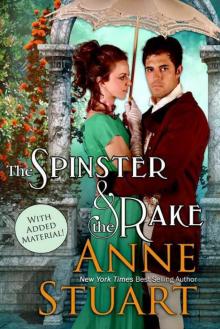 The Spinster and the Rake
The Spinster and the Rake Winter's Edge
Winter's Edge At the Edge of the Sun
At the Edge of the Sun Into the Fire
Into the Fire Night of the Phantom
Night of the Phantom Ritual Sins
Ritual Sins Darkness Before the Dawn
Darkness Before the Dawn Against the Wind
Against the Wind Ruthless
Ruthless The Catspaw Collection
The Catspaw Collection Escape Out of Darkness
Escape Out of Darkness The Widow
The Widow Shameless
Shameless Black Ice
Black Ice Breathless
Breathless Shadows at Sunset
Shadows at Sunset Falling Angel
Falling Angel Housebound
Housebound Cold as Ice
Cold as Ice The Wicked House of Rohan
The Wicked House of Rohan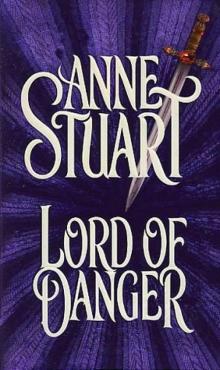 Lord of Danger
Lord of Danger The High Sheriff of Huntingdon
The High Sheriff of Huntingdon Wildfire
Wildfire Moonrise
Moonrise The Demon Count's Daughter
The Demon Count's Daughter Date With a Devil
Date With a Devil To Love a Dark Lord
To Love a Dark Lord Driven by Fire
Driven by Fire Special Gifts
Special Gifts Ice Storm
Ice Storm Shadow Lover
Shadow Lover A Dark & Stormy Night
A Dark & Stormy Night Now You See Him...
Now You See Him... Lady Fortune
Lady Fortune Glass Houses
Glass Houses A Rose at Midnight
A Rose at Midnight Prince of Swords
Prince of Swords One More Valentine
One More Valentine Return to Christmas
Return to Christmas Tangled Lies
Tangled Lies Consumed by Fire
Consumed by Fire The Fall of Maggie Brown
The Fall of Maggie Brown Wild Thing
Wild Thing Crazy Like a Fox
Crazy Like a Fox The Demon Count
The Demon Count Prince of Magic
Prince of Magic Wildfire (The Fire Series Book 3)
Wildfire (The Fire Series Book 3)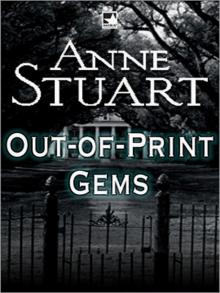 Anne Stuart's Out-of-Print Gems
Anne Stuart's Out-of-Print Gems Shadow Dance
Shadow Dance Under an Enchantment: A Novella
Under an Enchantment: A Novella Demonwood
Demonwood Blue Sage (Anne Stuart's Greatest Hits Book 3)
Blue Sage (Anne Stuart's Greatest Hits Book 3) Barrett's Hill
Barrett's Hill Angel's Wings (Anne Stuart's Bad Boys Book 5)
Angel's Wings (Anne Stuart's Bad Boys Book 5) Darkness Before Dawn
Darkness Before Dawn The Right Man
The Right Man The Houseparty
The Houseparty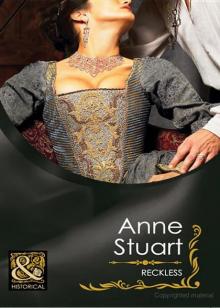 Reckless_Mills & Boon Historical
Reckless_Mills & Boon Historical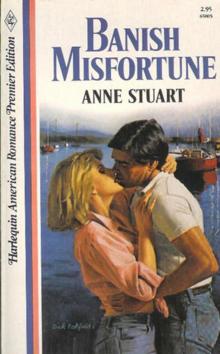 Banish Misfortune
Banish Misfortune Angel's Wings
Angel's Wings Chain of Love
Chain of Love Consumed by Fire (The Fire Series)
Consumed by Fire (The Fire Series) Partners in Crime (Anne Stuart's Bad Boys Book 4)
Partners in Crime (Anne Stuart's Bad Boys Book 4) The Soldier, The Nun and The Baby (Anne Stuart's Greatest Hits Book 2)
The Soldier, The Nun and The Baby (Anne Stuart's Greatest Hits Book 2)